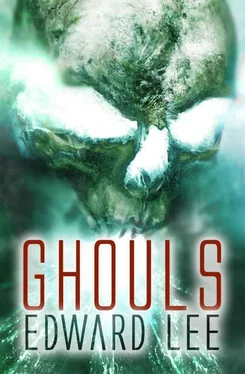— No, no, Van was bullshitting. I didn’t even talk to him yesterday. He could see I was in deep shit, so he made up the story about the armory bust to protect me. I was the one who took the weapons and ammunition out of the armory. —
— Please, Sergeant, please. That’s ridiculous. The SP’s have testified to what happened. Van Holtz has verified everything. —
The captain is smirking, — Don’t argue with him, he’s delusional. He doesn’t know what really happened. Retrograde amnesia. He’s filling the blank spot with a nightmare. —
Frustration and rage make your throat swell. Your face is burning beneath the gauze. Why don’t they believe you? — Would you people listen for one fucking second. Van Holtz lied, to cover me. O’Brien and Kinnet weren’t selling guns. It was the colonel’s idea! Get the colonel! —
— Sergeant, this colonel is no longer even in the service. He ETS’d weeks ago. —
— I know, I know, but he stayed behind without telling anyone. We arranged it that way, he stayed behind for this. He said he was going to pay us if we helped him, a hundred K split four ways between me, O’Brien, Kinnet, and Van. Van chickened out at the last minute, so it was just the three of us. O’Brien and Kinnet are dead. Can’t I get that through your thick heads? —
— I repeat, Sergeant. Your colonel left this country weeks ago. His signature is on all his TA-50 turn in, supply, the clinic, and also on the departure logs at the CQ and the airport. As for O’Brien and Kinnet, they are AWOL· and being sought for collusion with a terrorist faction and theft of government property. —
The pain in your face is cutting down like blades. You don’t even bother to shout anymore. — I already told you. They didn’t go AWOL, they didn’t steal guns. They were killed helping me. Go look. Send the SP’s. Their bodies might still be there. Some evidence, at least. —
— We’ve already sent some men, Sergeant, hours ago. Van Holtz took an armed squad to the exact location you specified. There were no bodies, no…limbs. All they found were several discharged grenade canisters, some guns, and a lot of empty bullet casings. —
— Look, I know it sounds crazy, but it’s true. They exist. I saw them. Van Holtz is lying . —
— Don’t worry, Sergeant. A little relaxation, a little of the right kind of treatment, and you’ll be as good as new. You’ve been through quite a lot in your career. A multitude of combat tours, duty stations all over the world, extensive training. A soldier can only do so much before the pressure and the memories get the best of him. —
Suddenly you don’t care anymore about the bandages, the damage, or the pain. Something in you, the structure of your sense of reason, perhaps, detonates. — You think I’m nuts, but I don’t give a shit! Fuck you! Fuck you both! How many times do I have to tell you goddamned asses! It’s the ghala! The ghala! —
— Not this again. Get the duty nurse! —
— The ghala! The ghala! —
— Sergeant, you’re going to tear out your stitches if you don’t stop. Captain, I’ll need something to put him out. Hurry. —
— The ghala! The ghala! —
««—»»
“The ghala,” he whispered to himself. Behind him a long, pitchless car horn blared. In the rearview he saw a fat black woman mouthing obscenities in the windshield of her car. Traffic was moving again, but Sanders hadn’t noticed. He’d been immersed in the daydream, forced to recall a scene he’d hoped was forgotten entirely. The black woman was leaning on her horn now. It brayed at him like a beast caught in a trap.
Sanders accelerated, for all the good it did. Less than a minute later, another stoplight turned red, and the traffic on West Pratt Street stopped again. It was one thing he’d taken for granted in the military; Army bases didn’t have traffic jams. He wondered if he’d ever get to East Baltimore Street.
He’d had an involving day, though little to show for it thus far. First thing that morning he’d taken a bus to BWI Airport. There, he’d crossed the LONG-TERM lot, as if heading for the terminal, when a beige Plymouth station wagon—the car which he now drove—parked and discharged its sole occupant, a well-dressed, stoic-faced lawyer type. Sanders knew that the minimum parking time in the long-term lot was three days. He hoped that would be enough time to do what he had to do, and if so, he wasn’t really stealing the car, but annexing it temporarily. He had every intention of returning it; he’d chosen the long-term lot because it gave him a minimum seventy-two hour head start before the vehicle would be reported stolen. When he was through with it, he’d simply park it somewhere reasonably safe. An anonymous letter would then be mailed to the owner, containing a just amount of cash, as compensation for any inconvenience, plus the location of the vehicle.
Sanders had followed the owner into the terminal; he’d managed to overhear the flight number, and eventually the owner had boarded. Five minutes after the flight’s departure time, Sanders had then walked back out to the long-term lot. He approached the car as if he owned it, his tension wrench and favorite “hook” already concealed in the proper hands. He preferred picking pre-88 Plymouths, not because there was a significant difference in lock design, but because over the years, as a locksmith, he’d simply developed a knack for them.
He opened the car door as quickly as if he’d had the key, and he did the same with the ignition. He’d already noted that the entrance gate was unmanned; therefore, the guard at the exit booth would not know that Sanders wasn’t the same person who’d driven this car onto the lot just minutes before. He’d handed out the ticket stub, claiming he’d forgotten his luggage and would return shortly. He paid the minimal fare and drove away.
He would memorize the owner’s name and address off the registration; if stopped he could more than likely stonewall an excuse of borrowing the car from a friend, since it would not yet be listed as stolen in the police computers. While in the Army, he’d never let his Florida driver’s license expire. He would just have to be very careful, but then that was a natural trait. And since his fingerprints were on federal file, he’d wipe the car down with isopropanol when he was done with it.
Next he drove to an NTW in Laurel and had four new steel-belted radials put on the Plymouth. At the nearest service station, he topped the tank, and got a complete tune-up, oil change and lube, and brake inspection. He also purchased and filled two five-gallon jerry cans.
And after all that, he’d driven to the heart of Baltimore and gotten stuck in the worst traffic jam he’d ever seen.
Potholes here were as large as grenade sumps. On some streets he couldn’t avoid them no matter how expertly he zigzagged. He sensed in Baltimore a vast, graying state of decomposition, spiritual as well as physical. The city offended every angle of perception. Traffic noise clawed his nerves. Streets melded into a labyrinth of compressed gloom. Boarded, gutted row houses stood decrepitly, left to collapse. All around him were abandoned road repairs; packs of scavenging, gut-sucked dogs; garbage-filled alleys; and columns of high, drab buildings streaked by rust. Street people stared into space, swaddled in rotting clothes. Pedestrians traversed the sidewalks in a parade of leering, unfriendly faces. The city stank. Sanders had smelled better open sewers; it was even worse than Paris. Something vile and membranous filmed the inside of his mouth. He could actually taste the carbon monoxide, the trash vapor, and the overall rot in the air. He could taste it. They ought to nuke this place, he thought. Then just fill the crater with toxic sludge. This isn’t a city. It’s an ass-crack.
Читать дальше












